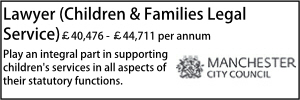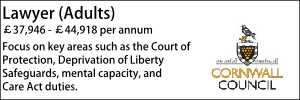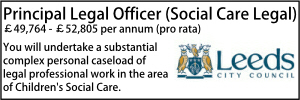

The final say
News
Must read
Families refusing access to support
Features Test

Producing robust capacity assessments and the approaches to assessing capacity

Disability discrimination and proportionality in housing management

Cross-border deprivation of liberty

Dealing with unexplained deaths and inquests

Court of Protection case update: May 2025
Features

Producing robust capacity assessments and the approaches to assessing capacity

Disability discrimination and proportionality in housing management

Cross-border deprivation of liberty

Dealing with unexplained deaths and inquests

Court of Protection case update: May 2025
Sponsored articles
What is the role of the National Trading Standards Estate & Letting Agency Team in assisting enforcement authorities?
Webinars
Is Omeprazole the new EDS?
More features
Provision of same-sex intimate care
Court of Protection case update: April 2025
High Court guidance on Article 3 engagement in care at home cases
‘Stitch’, capacity and complexity
Issuing proceedings in best interests cases
Court of Protection case law update: March 2025
The Health and Social Care (Wales) Bill Series – Regulation and Inspection of Social Care
The Health and Social Care (Wales) Bill Series – Direct Payments for NHS Continuing Healthcare
What is the right approach to Care Act assessments?
Disabled people in immigration bail: the duties of the Home Office and local authorities
Capacity, insight and professional cultures
Court of Protection update: February 2025
Setting care home fees
Could this be the end for local authority-provided residential care?
“On a DoLS”
It’s all about the care plan
Court of Protection case update: January 2025
Mental capacity and expert evidence
Best interests, wishes and feelings
Capacity, sexual relations and public protection – another go-round before the Court of Appeal
Court of Protection Update - December 2024
Fluctuating capacity, the “longitudinal approach” and practical dilemmas
Capacity and civil proceedings
Recovering adult social care charges via insolvency administration orders
Court of Protection case update: October 2024
Communication with protected parties in legal proceedings
The way forward for CQC – something old, something new….
The Ombudsman, DoLS and triaging – asking the impossible?
Outsourcing and the Human Rights Act 1998 – the consequences
Commissioning care and support in Wales: new code of practice
Representation of the people
- Details
The pendulum has swung back in favour of employers when it comes to the right to legal representation at an internal hearing, says Jennifer Jones. The case is likely to have particular impact in cases where the employees are dealing with vulnerable groups of service users.
You will no doubt have noticed the trend of late for employees faced with disciplinary proceedings to claim that they are entitled as of right to be represented at a disciplinary hearing by a qualified lawyer.
This is especially so in the context of serious allegations of misconduct such as those which may arise in connection with staff working with vulnerable groups of service users, such as staff within children’s or adult services. The easy line is to agree. After all, this often serves to assist the employer later on at an Employment Tribunal when fresh arguments, (discrimination, whistle-blowing, etc.) are raised for the first time that were not mentioned in the employee’s defence at the disciplinary hearing.
But is this the right approach at a time when austerity measures mean that the public sector’s ability to provide a gold star adversarial-type disciplinary process must surely be limited? There is no escaping the fact that allowing solicitors or barristers to represent employees at internal hearings tends to lengthen the process and increase cost, not least because most internal Panels will want their own legal adviser if the employee is bringing his or hers.
This trend gained ground following the decision of the Court of Appeal in Kulkarni v Milton Keynes Hospital NHS Foundation Trust [2009] EWCA Civ 789. In that case K, a trainee doctor, was accused of a sexual assault on a patient. He was suspended and brought before an internal disciplinary panel. His employer declined to permit him to be represented by a legally qualified representative and he brought proceedings in the High Court to challenge this. The doctor won in both the High Court and the Court of Appeal on the basis that his contract, properly construed, gave him this right. The case was given broader application, however, as a result of the Court of Appeal’s obiter comments to the effect that, wherever a public sector employee is facing such serious charges at an internal disciplinary hearing that may result in his dismissal in circumstances in which he will find it virtually impossible to find employment elsewhere, Article 6 of the European Convention of Human Rights applies.
The application of Article 6 can give rise to the assertion of a right to legal representation as well as to suggestions as to how the procedure should be conducted and how independent the Panel should be to the employing organisation.
As is the case so often with legal trends, the pendulum having swung far in one direction, it now appears to be firmly on its way back. The Supreme Court gave judgment on 29 June 2011 in the case of R (on the application of G) v The Governors of X School [2011] UKSC30 considering this issue once again.
The claim concerned a 22 year old teaching assistant working for X school as a sessional music assistant. This employee had an encounter with a 15 year old boy who was undergoing a short period of work experience at the school, and this led to allegations being made by the boy’s parents that the Claimant had initiated a sexual relationship between them. The employee was suspended and the inevitable investigation followed leading to the employee facing a charge of gross misconduct for having formed an inappropriate relationship with a child. The disciplinary hearing was to be dealt with by three of the school’s governors, including the Chair, assisted by an HR Adviser from the employer’s Schools Education Advisory Team. Prior to the disciplinary hearing the Claimant’s solicitors wrote to the school seeking permission for them to represent him at the hearing and arguing, in line with Kulkarni, “the potential repercussions of an adverse finding and the potential impact on our client is such that it would be a breach of human rights not to be represented”.
The school refused this request maintaining that the Claimant was entitled to be represented by a trade union representative or work colleague, in accordance with section 10 Employment Relations Act 1999 and the disciplinary procedure. The hearing went ahead and the Claimant was dismissed. The Chair of Governors notified the Children’s Safeguarding Operations Unit and the case was referred to the Independent Safeguarding Authority (ISA) to establish whether or not the Claimant should be included on the “children’s barred list”.
In both the High Court and Court of Appeal the employee successfully established that, in order the preserve his human rights, he should have been allowed to be represented at the disciplinary hearing by a legally qualified representative. This was based on the argument that the decision of the governing body at the disciplinary hearing would have a decisive impact on the decision which would be taken by the ISA as to whether or not the Claimant should be included on the “children’s barred list”. This was said to be so in particular because the ISA had no independent fact-finding procedure which involved a hearing giving the Claimant the opportunity to challenge evidence by cross-examination.
The Supreme Court disagreed, however. The Court dismissed the suggestion, which had been accepted by the Court of Appeal, that the findings of fact made by an employer’s disciplinary panel are generally and in most cases likely to exercise a profound influence on the decision-making process before the ISA. Having referred to the guidance notes and case worker guidance relating to decisions of the ISA, the Supreme Court was satisfied that the ISA would make its own findings of fact based on all the available material. Further, the lack of an oral hearing did not, held the Supreme Court, prevent the ISA from making its own findings of fact.
As a consequence, the Supreme Court decided that the only issue being determined by the governing body was the Claimant’s contractual right to remain in his current employment at that school. Their decision was not determinative of his civil right to practise his profession as a teaching assistant and Article 6 of the European Convention on Human Rights was therefore not engaged.
It is encouraging to read in the judgment of Lord Hope in this case that a thought was spared for the day to day complexities faced by public sector employers. In considering the impact of accepting the Claimant’s arguments he stated that “there is a serious risk that, if that course were to be adopted, disciplinary proceedings in the public sector would be turned into a process of litigation, with all the consequences as to expense and delay that that would involve. The burden that this would impose on employers, and its chilling effect on resort to the procedure for fear of its consequences is not hard to imagine”.
So, there is hope for employers (if you pardon the pun). It is and remains only in the most exceptional of cases where the European Convention on Human Rights is likely to give an employee additional rights and safeguards over and above the generously drafted disciplinary procedures operated by most, if not all, local government employers. Employers are encouraged to be bold and not shy away from their right to manage their staff in the public interest.
Jennifer Jones is a Barrister and Head of Employment at Plexus Law. She can be contacted on 01386 769191 or by email at
Winterbourne View provider failed ten standards required by law, says CQC
- Details
The registered provider that ran the Winterbourne View assessment and treatment centre near Bristol failed to comply with ten essential standards required by law – including the requirement to report serious incidents, the Care Quality Commission has said.
Winterbourne View was shut in June after a Panorama programme exposed serious abuse of patients at the centre.
According to the watchdog, the ten standards failed by Castlebeck Care (Teesdale) Ltd were:
- “The managers did not ensure that major incidents were reported to the Care Quality Commission as required
- Planning and delivery of care did not meet people's individual needs
- They did not have robust systems to assess and monitor the quality of services
- They did not identify, and manage, risks relating to the health, welfare and safety of patients
- They had not responded to or considered complaints and views of people about the service
- Investigations into the conduct of staff were not robust and had not safeguarded people
- They did not take reasonable steps to identify the possibility of abuse and prevent it before it occurred
- They did not respond appropriately to allegations of abuse
- They did not have arrangements in place to protect the people against unlawful or excessive use of restraint
- They did not operate effective recruitment procedures or take appropriate steps in relation to persons who were not fit to work in care settings
- They failed in their responsibilities to provide appropriate training and supervision to staff.”
The report concluded that there was “a systemic failure to protect people or to investigate allegations of abuse”. It said the provider had failed to notify the CQC of serious incidents including injuries to patients or occasions when they had gone missing.
Inspectors decided that the centre’s staff did not appear to understand the needs of the people in their care –adults with learning disabilities, complex needs and challenging behaviour. “People who had no background in care services had been recruited, references were not always checked and staff were not trained or supervised properly,” the Commission said. “Some staff were too ready to use methods of restraint without considering alternatives.”
Amanda Sherlock, the CQC’s Director of Operations, said: “This report is a damning indictment of the regime at Winterbourne View and its systemic failings to protect the vulnerable people in its care.
“It is now clear that the problems at Winterbourne View were far worse than were initially indicated by the whistleblower. He has stated that he was not aware of the level of abuse until he saw the footage from the secret filming.”
Sherlock said the CQC now knew that the provider had effectively misled it by not keeping it informed about incidents as required by the law. “Had we been told about all these things, we could have taken action earlier,” she said. The CQC will now consider whether it is appropriate to take further legal action.
However, Sherlock insisted that it was “incorrect” that the CQC had failed to act on warnings by the whistleblower. “Our internal investigation has confirmed that while we were aware of those concerns, our inspector believed they were being dealt with through the local safeguarding process involving a number of agencies,” she said.
“We should have contacted the whistleblower directly – and this will be one of the issues which will be addressed by the independently-led serious case review. Immediately we were aware of the extent of the problem, we took the action which is detailed in this report. Although Winterbourne View is now closed, we will continue to monitor Castlebeck's other services closely.”
The CQC will publish the outcome of its review of all of Castlebeck Care (Teesdale) Ltd’s 24 locations at the end of July.
War of words
- Details
A recent Supreme Court ruling over the lawfulness of changes to a disabled woman’s care package revealed a significant division between the majority of the judges and Baroness Hale. Carl Gardner analyses the dispute.
Because of bladder problems, Elaine McDonald needs to go to the toilet several times during the night; and because of mobility problems, she can’t get there safely on her own. Kensington & Chelsea have decided that her needs can be met by the use of incontinence pads, which is about £22,000 a year cheaper than what she wants: an overnight carer to help her get to the toilet.
By a majority of four to one, the Supreme Court has upheld the lawfulness of Kensington & Chelsea’s decision. Not only is this an emotive issue – the judgment is fascinating because of the harsh criticism aimed by some of the majority Justices against their dissenting member, Lady Hale. More of that later.
The first, and to my mind rather technical issue, was whether, after Kensington & Chelsea had in 2008 assessed the claimant as needing “assistance to use the commode at night”.
it had properly changed that assessment in subsequent reviews, which spoke in more general terms of her “nighttime toileting needs”. By three to one, the Justices ruled that the council had changed its assessment. The dissent came from Lord Kerr, but even he thought the council was entitled to change its mind, so that a failure to do so by the route of another formal needs assessment was merely technical. I don’t think Lady Hale made any decision on the point.
Second, it was argued that the decision to provide incontinence pads breached Ms. McDonald’s article 8 Convention right to respect for private life. Again, the majority (this time of four) ruled in favour of the council. As Lord Brown explained (paragraph 19): “It cannot plausibly be argued that such respect was not afforded here … the respondents went to great lengths … to consult the appellant … They respected the appellant’s human dignity and autonomy, allowing her to choose the details of her care package within their overall assessment of her needs … the appellant cannot establish an interference here by the respondents with her article 8 rights. I add only that, even if such an interference were established, it would be clearly justified under article 8(2) … on the grounds that it is necessary for the economic well-being of the respondents and the interests of their other service-users and is a proportionate response to the appellant’s needs …”
The majority also rejected two arguments based on the Disability Discrimination Act 1995, both of which Lord Brown described as “hopeless” (paras. 22 and 24). Lords Walker, Kerr and Dyson agreed.
Lady Hale did not address those four issues at all: instead she looked purely at the rationality of the council’s decision, a point raised by interveners, AgeUK. The core of her reasoning is at paragraphs 75 and 76: “It seems to me that the need for help to get to the lavatory or commode is so different from the need for protection from uncontrollable bodily functions that it is irrational to confuse the two, and meet the one need in the way that is appropriate to the other. Of course, there may well be people who are persuaded that this is in fact a more convenient, comfortable and safer way of solving the problem; then it is no longer irrational to meet their need in this way. The authority suggest that this is “accepted practice” but they cannot point to evidence that it is accepted practice in effect to oblige the client to accept it … the fact that they have been trying so hard for so long to persuade her to accept their point of view does not mean that it is a rational view or one which she is bound to accept. For the reasons already given, I do not think that it is.”
But at paragraph 77 she went on to outline her further concerns: “Furthermore, I am troubled by the implications of the contrary view. A person in her situation needs this help during the day as well as during the night and irrespective of whether she needs to urinate or to defecate. Logically, the decision of the majority in this case would entitle a local authority to withdraw this help even though the client needed to defecate during the night and thus might be left lying in her faeces until the carers came in the morning.”
She concluded her judgment, at paragraph 79, by strongly implying that the majority’s decision is “uncivilised”: “In the United Kingdom we do not oblige people who can control their bodily functions to behave as if they cannot do so, unless they themselves find this the more convenient course. We are, I still believe, a civilised society. I would have allowed this appeal.”
Sympathy with Ms. McDonald will lead many to agree with her. I’ve accused Lady Hale in the past of wearing her liberal heart on her sleeve, and I think this is another example. On this occasion, though, the language she used seems to have irritated some of the majority into responding with their own trenchant criticism of her approach. At paragraph 32 for instance Lord Walker says: “I totally disagree with, and I deplore, Lady Hale’s suggestion that the decision of the majority would logically entitle a local authority to withdraw help from a client so that she might be left lying in her faeces day and night, relieved only by periodic changes of absorbent pads or sheets.”
While at paragraph 27, Lord Brown says: “It seems to me, with great respect to Lady Hale’s acknowledged expertise in social care law, particularly surprising to find her saying (in para 77) that logically, on the majority’s view, the local authority could properly withdraw care 'even though the client needed to defecate during the night and thus might be left lying in her faeces until the carers came in the morning' or, indeed, 'withdraw this help during the day'. One might just as well say that logically, on Lady Hale’s approach, it would be irrational not to supply a night carer to take the client to the commode, irrespective of cost, if there is any likelihood of the client having to urinate even once during the night. The true position is that the decision is one for the local authority on the particular facts of the case and, on the particular (and undisputed) facts here, it is nothing short of remarkable to characterise the respondents’ decision as irrational.”
He goes on, devastatingly in my view, to point out that Lady Hale appeared entirely to have missed an important background fact: “As to the cost, Lady Hale says (at para 74) that ‘it might well have been open to the local authority . . . to provide her with the sort of night time care that she was asking for . . . in one of the Extra Care Sheltered Housing Schemes in the borough.’ As, however, may be seen from the ‘Conclusion’ to the borough’s 2010 review (quoted in para 11 above), the appellant ‘has declined the offer of moving to one of the borough’s extra care sheltered housing schemes.’ In other words, the appellant specifically refused that very solution which Lady Hale mentions.”
I agree that this undermines Lady Hale’s reasoning considerably.
Many people will be instinctively attracted to Lady Hale’s approach in spite of this, as I’ve said, simply because they, like me and like the majority, sympathise with Ms McDonald. I wouldn’t want to be in her situation. But I can’t agree with Lady Hale.
What concerns me most about cases like this one is the effect of judicial decisions on democracy at the local level. Decisions about what should be done for Ms. McDonald cannot be seen in isolation: resources are limited, however much we might wish it otherwise. To see care provision in terms of absolute entitlement in the way I think Lady Hale effectively does (i.e. the claimant’s need can be characterised as needing help to get to the toilet, and that’s what she wants, therefore she has an absolute legal right to it regardless of cost) seems to me to wish away that reality.
Decisions about the allocation of resources must be for the council, and councillors must be politically accountable for what they do. If those who live in Kensington & Chelsea don’t like what’s been done to Ms. McDonald, they must decide what else they want to do: transfer money from elsewhere within the social services budget, take money from some other budget (such as library or environmental services), cut council staff wages (including perhaps those of the carers they’d like to look after Ms. McDonald) or increase the council tax bill or some other charge, for instance for parking. Or, if they think local government budgets aren’t big enough, they should complain to Eric Pickles.
Judges can if they wish heroically order a particular form of care for people in real need, leaving local authorities and social workers with the awkward, unglamorous job of deciding who else to say no to instead. But if they do, local government and social work soon become merely administrative exercises in implementing the not necessarily very consistent diktats of Whitehall and the courts. If we want any hope of reviving local government, and if we want professional experts rather than judges to make difficult individual decisions in complex areas, we should certainly not go that way.
Carl Gardner is a barrister and former government lawyer. He writes the Head of Legal blog, where this article first appeared. http://www.headoflegal.com/ He can be contacted at
Playing safe
- Details
The Steven Neary case in the High Court is a very significant ruling for local authorities and Primary Care Trusts dealing with the Deprivation of Liberty Safeguards. Simon Lindsay looks at the judgment.
The case of Steven Neary is interesting, not just because it has attracted a great deal of press attention, but in particular because of the analysis and comments on the responsibilities of supervisory authorities (PCTs and local authorities) when dealing with the Deprivation of Liberty Safeguards.
The background and decision
Steven Neary was moved to a care home in Hillingdon, in spite of the objections of his father, in January 2010. For a variety of reasons the Court found that Steven was deprived of his liberty unlawfully and was deprived of his right to family life and privacy for the best part of a year. The responsible authority in this case, the London Borough of Hillingdon, also failed to apply to the Court of Protection early enough to obtain a proper legal framework which would have legitimised the circumstances in which Steven was being kept. The judge made it clear that Hillingdon LBC failed to ensure that proper steps were taken to safeguard Steven’s fundamental human rights.
Discussion
At one level, this case underlines the importance of ensuring that vulnerable, incapable individuals who are potentially or actually deprived of their liberty should receive proactive attention from the relevant authorities. Within the framework for obtaining an Authorisation for Deprivation of Liberty provided by the Mental Capacity Act, a PCT or a local authority should not simply rely on the resources or tenacity of such an individual or his family.
One of the criticisms raised by the judge in this case was: “[Hillingdon] acted as if it had the right to make decisions about Steven, and by a combination of turning a deaf ear and force majeure, it tried to wear down Mr Neary’s resistance, stretching its relationship with him almost to breaking point. It relied on him coming to see things its way, even though, as events have proved, he was right and it was wrong. In the meantime it failed to activate the statutory safeguards that exist to prevent situations like this arising.”
To require the statutory authorities to engage with the family in a meaningful sense would probably be no surprise to anyone. This case shows that a supervisory body or a state organisation responsible for caring for an individual who may be deprived of his liberty, ignores that person’s family at its peril.
Of similar importance is the clarification of the role of the supervisory body in relation to applications for Authorisations under the Deprivation of Liberty Safeguards Procedure. Those safeguards must be obtained in accordance with the procedure set out in Schedule A1 to the Mental Capacity Act. The procedure is complex and requires six assessments to be undertaken. Paragraph 50 of the Schedule provides that a supervisory body must give a standard authorisation if all the assessments are positive.
On the face of it, this suggests that the supervisory body has a passive role, akin to rubber stamping the findings of the assessors. The judge in the Neary case clarified that this is not so. He said that: “The suggestion that the supervisory body is bound to act on any assessment that is not grossly and obviously defective sets the standard too low. It supposes an essentially passive supervisory body. This would not meet the objectives of the Act and would not provide effective protection against breaches of Article 5”.
The obligation of a PCT which receives an assessment which it knows, or ought to know, is inadequate is firstly not to follow the recommendation made. Secondly it should take all necessary steps to remedy the inadequacy. If necessary this should include bringing the deprivation of liberty to an end by conducting a review or applying to Court.
This brings the role of the supervisory body closer to that of Mental Health Act Managers. One of the criticisms of the Deprivation of Liberty Safeguards procedure was that it was all procedure and no safeguards. This case has gone some way to addressing that criticism, but the procedure is still a long way from the detailed provisions set out in the Mental Health Act. PCTs will need to review their practices in dealing with applications for Authorisations, including separating functions within their organisations and ensuring that where papers are received they are proactively considered.
Practice issues for those working in the field
In his judgment in paragraph 33, Mr Justice Peter Jackson identified three practice points for those working in the field:
- "The purpose of DOL authorisations and of the Court of Protection: Significant welfare issues that cannot be resolved by discussion should be placed before the Court of Protection, where decisions can be taken as a matter of urgency where necessary."
- "Decision-making.: Where a local authority wears a number of hats, it should be clear about who is responsible for its direction."
- "The responsiblities of the supervisory body: The responsibilities of a supervisory body, require it to scrutinise the assessment it receives with independence and a degree of care that is appropriate to the seriousness of the decision and to the circumstances of the individual case that are or should be known to it."
In addition Mr Justice Peter Jackson found that there was a breach of Steven's rights under Article 5(4) because:
- an IMCA should have been appointed in April 2010. LB Hillingdon should have persisted in obtaining one for Steven Neary;
- there was no effective review;
- the local authority had an obligation "to ensure that a person deprived of liberty is not only entitled but enabled to have the lawfulness of his detention reviewed speedily by a court."
Simon Lindsay is a partner at Bevan Brittan. He can be contacted on
See also: Council unlawfully kept 21-year-old man in care for a year, says High Court judge
Proposed change in care package for disabled woman not unlawful, rules Supreme Court
- Details
A local authority did not act unlawfully when it sought to amend a disabled woman’s care package by substituting her night-time carer with the provision of incontinence pads when she was not in fact incontinent, the Supreme Court has ruled.
The decision is expected to give local authorities greater discretion in deciding how to meet people’s needs, but has been described by the Equality and Human Rights Commission as “a serious setback” for people who receive care in their home.
In the case of R (on the application of McDonald) v Royal Borough of Kensington and Chelsea [2011] UKSC 33, Ms McDonald had suffered a stroke in September 1999 which left her with severely limited mobility. The appellant also suffered from a small and neurogenic bladder which makes her have to urinate some two to three times a night.
Through a care package provided by RBKC, she was able to access a commode with the help of a carer. In November 2008, however, the local authority suggested that Ms McDonald should use pads.
This would mean there was no need for a night-time carer and reduce the cost of her care by £22,000 a year. It was argued that the change would also provide Ms McDonald with greater safety, on the basis that the risk of injury whilst she was helped to the commode was removed. She would also enjoy independence and privacy, the council suggested.
Ms McDonald challenged the decision, suggesting that the thought of being treated as incontinent and having to use the pads was an "intolerable affront to her dignity".
She lost in the High Court, where the deputy judge held that it was open to the local authority to meet Ms McDonald’s need, identified in a Needs Assessment dated 2 July 2008 as “assistance to use the commode at night”, in a more economical manner by provision of pads.
The Court of Appeal disagreed. It said the clear language of the Needs Assessment could not be extended in a way proposed by the deputy judge and that at the time when proceedings were commenced Kensington and Chelsea was in breach of its statutory duty.
However, the Court of Appeal concluded that since the council’s decision to amend the care package was not in fact put into operation, and since the need had been reassessed in Care Plan Reviews of November 2009 and April 2010 as the appellant’s “night-time toileting need”, Ms McDonald had no substantial complaint.
Ms McDonald took her claim to the Supreme Court, where she argued that:
- the 2009/2010 Care Plan Reviews did not in fact contain a reassessment of her needs
- the decision breached her rights under article 8 of the European Convention on Human Rights (“article 8”), the right to respect for private and family life
- the decision was taken in breach of section 21 of the Disability Discrimination Act 1995 (“DDA”); and
- the council failed to have due regard to the need to promote equality of opportunity of disabled persons under section 49A of the DDA (now superseded by comparable provisions in the Equality Act 2010).
The Supreme Court has dismissed the appeal, by a majority of 4-1.
On the first issue, Lord Brown, who gave the lead judgment, said it seemed impossible not to agree with Rix LJ’s conclusion in the Court of Appeal.
This was that, in accordance with the Fair Access to Care Services (FACS) Guidance issued by the Secretary of State for Health, the Care Review Plans could and in fact did incorporate a review of Ms McDonald’s needs.
Lord Walker added: “In construing assessments and care plan reviews, it should not be overlooked that these are documents that are usually drafted by social workers. They are not drafted by lawyers, nor should they be.
“They should be construed in a practical way against the factual background in which they are written and with the aim of seeking to discover the substance of their true meaning.”
Lord Walker said he was in no doubt that the Care Plan Reviews contained reassessments of Ms McDonald’s needs.
Lord Kerr agreed with the majority but took a narrower view. He concluded that although the council did not intend to carry out a re-assessment of the appellant’s needs in the 2009/2010 Care Plan Reviews, in fact “the exercise then conducted yielded sufficient information to allow the court to conclude that Ms McDonald’s needs could be properly re-cast and warranted a change in the means by which those needs may legally be met”.
On the issue of Ms McDonald’s Article 8 rights, the Supreme Court ruled that she could not establish that there had been interference.
Lord Brown said: “There is, of course, a positive obligation under Article 8 to respect a person’s private life. But it cannot plausibly be argued that such respect was not afforded here.
“The respondents went to great lengths both to consult the appellant and Mr McLeish [her partner] about the appellants’ needs and the possible ways of meeting them and to try to reach agreement with her upon them.”
The judge said the council respected Ms McDonald’s human dignity and autonomy, allowing her to choose the details of her care package within their overall assessment of her needs.
Lord Brown added that even if Article 8 interference were established, it would be clearly justified under article 8(2) on the grounds that it was necessary for the economic well-being of the borough and the interests of its other service-users, and was a proportionate response to Ms McDonald’s needs by affording her the maximum protection from injury, greater privacy and independence, and would result in a substantial costs saving.
Lord Brown also rejected the appellant’s claim of a breach of section 21 of the DDA, under which the council may not operate any “practice, policy or procedure” which makes it impossible or unreasonably difficult for disabled persons to receive any benefit conferred on them.
The judge said he found it impossible to regard RBKC’s decision in the case as the manifestation or application of anything that could properly be characterised as a “practice, policy or procedure” within the meaning of the legislation.
“Rather, in taking the impugned decision, the respondents were doing no more and no less than their statutory duty,” he said.
Even if that were not the case, the council’s acts must be regarded as constituting “a proportionate means of achieving a legitimate aim” within the meaning of section 21D(5) of the DDA.
On the fourth issue – the alleged failure to have “due regard” – Lord Brown said that where the public authority is discharging its functions under statutes which expressly direct its attention to the needs of the disabled persons, “it may be entirely superfluous to make express reference to section 49A of the DDA and absurd to infer from an omission to do so a failure on the authority’s part to have regard to their general duty under the section”.
The question is one of substance, not of form, the judge said.
The dissenting judgment was given by Lady Hale, who said she would have allowed Ms McDonald’s appeal on a basis outlined by Age UK in its intervention (but not raised by the appellant).
Lady Hale agreed with Age UK that it was “irrational in the classic Wednesbury sense” for the local authority to characterise Ms McDonald as having a need different from the one she in fact had.
Under section 2(1) of the Chronically Sick and Disabled Persons Act 1970, disabled people have a right to practical assistance from their local authority to meet their needs. Lady Hale said that in complying with section 2(1) the local authority had to answer rationally two separate questions: first, what are the needs of the disabled person and second, what is necessary to meet those needs?
The judge said it seemed to her that the need for help to get to the lavatory or commode was so different from the need for protection from uncontrollable bodily functions that it was irrational to confuse the two, and meet the one need in the way that is appropriate to the other.
Lady Hale added: “In the United Kingdom we do not oblige people who can control their bodily functions to behave as if they cannot do so, unless they themselves find this the more convenient course. We are, I still believe, a civilised society.”
Age UK suggested that the ruling could have “potentially devastating” consequences for thousands of older people if other councils took similar decisions to that taken by Kensington and Chelsea.
Michelle Mitchell, Charity Director at Age UK, claimed the decision was "shameful". She said: "Older people have a fundamental right to dignity and forcing someone to sleep in their own urine and faeces could not be more undignified.
"This judgement opens the door to warehousing older people in their own homes without regard to their quality of life. Care should not be just about keeping people safe. It must enable them to live dignified and fulfilled lives.”
Alex Rook of Irwin Mitchell solicitors who represented Age UK said: "The submissions Age UK made to the Supreme Court in this case sought to ensure that local authorities follow the correct assessment procedures to establish an older person’s needs and to then put in place a lawful package of care.
“Whilst Age UK is acutely aware of the current difficult economic climate, the right balance must be struck between the rights of the individual and the interests of the community, and Age UK continues to find it difficult to understand how it can be rational or reasonable to expect an older continent person to use incontinence pads rather than to assist them to access a toilet.”
John Wadham, Group Director (Legal) at the Equality and Human Rights Commission, described the ruling as a significant setback for people who receive care in their home. “Ms McDonald is not incontinent, however this judgment means she will be treated as such,” he said.
Wadham added: “Local authorities will now have greater discretion in deciding how to meet a person's home care needs and will find it easier to justify withdrawing care. This means that older people's human rights to privacy, autonomy and dignity will often be put at serious risk.
"The Court has missed a significant opportunity to interpret the law to protect some of the people most vulnerable to harm in society. The Commission's inquiry into care in the home has already highlighted some of the problems with the current system of home care. This judgment will only fuel those problems."
Philip Hoult
Report slams council and NHS trust after man left to live in "unacceptable" conditions
- Details
An NHS trust and a local authority have been sharply criticised following a joint investigation by the Health Service Ombudsman and the Local Government Ombudsman into how a vulnerable man with schizophrenia was left to live in “unacceptable” conditions.
The joint Community Mental Health Team run by St Helens Metropolitan Borough Council and the 5 Boroughs Partnership NHS Trust was responsible for the care of Mr B, who had a long history of involvement with mental health services.
He lived independently in his own home for more than ten years with a support package, which included regular visits from a support worker and a community psychiatric nurse from the CMHT along with practical help from cleaners employed by St Helens.
But Mr B’s health and living conditions deteriorated and he was unable to care for himself. He also developed a serious physical illness.
His cousin, Ms A, contacted 5 Boroughs and the council after becoming concerned about his personal health and hygiene and the condition of his flat. Dissatisfied with their responses, she complained to the Ombudsmen.
According to the cousin’s account, Mr B had come to their aunt’s home in a dirty and unkempt state. He had lost a lot of weight and was feeling unwell.
She visited his flat and found cockroaches and flies as well as food that was more than a year out of date. There was uneaten takeaway food, stains on every surface, and faeces and urine stains on the carpets and furniture. The cousin said it took her several days to clean the flat.
When Mr B returned home, his physical health deteriorated and he was admitted to hospital in an emergency. He was found to be suffering from malnutrition, dehydration and a number of other symptoms.
Mr B was subsequently diagnosed with a type of bone cancer and died later in a nursing home.
The Ombudsmen’s report did not uphold two of Ms A’s complaints, namely that: Mr B’s consultant psychiatrist had failed to respond to his poor physical state and had instead prescribed inappropriate drugs for depression; and that no one had supported Mr B to claim the welfare benefits to which he was entitled.
However, the report concluded that the CMHT had failed Mr B. It said that his care plan was not properly implemented, there had been insufficient contact over a period, there had been poor communication, and there were gaps in records.
The report also said there had been a failure to review Mr B’s care, to assess in depth his mental state, capacity or risk. The council’s cleaners had raised concerns but little action followed, it added.
The Ombudsmen said they could not definitely conclude that there would have been a different outcome for Mr B, in terms of the diagnosis and treatment of his myeloma. But they did find that the failure to implement his care plans and to manage risk appropriately played some part in his rapid deterioration.
The Health Service Ombudsman, Ann Abraham, said: “This is an extremely sad case about a vulnerable person who was not supported in the way he should have been. The Trust and the Council failed to deliver the standard of care Mr B was entitled to and he was left to live in unacceptable conditions.”
Anne Seex, the LGO, said the investigation had resulted in assurances from 5 Boroughs and St Helens that lessons had been learnt and others were now less likely to suffer as Mr B did.
“A key lesson is the importance of observations from workers like cleaners who had the most regular contact with Mr B,” she added.
Seex added that the Ombudsmen’s power to investigate complaints jointly was particularly important when health and local government join together to provide a combined ‘seamless’ service. “Joint services mean joint accountability if things go wrong,” she said.
In recognition of the distress and emotional upset Mr B’s family experienced, the Ombudsmen recommended that the Trust and the Council apologise to Ms A and pay her £2,000 compensation. They called on the public bodies to pay a further £1,500 to cover her legal costs.
The Ombudsmen also asked 5 Boroughs and St Helens to produce an action plan within three months of the final report, setting out what they would do to prevent other vulnerable people being let down in the same way in the future. The Trust and the Council have agreed to all of the Ombudsmen’s recommendations.
Page 246 of 270
Locums
Case Law Update

The final say
In association with...

Poll
in association with...

Events

Directory































